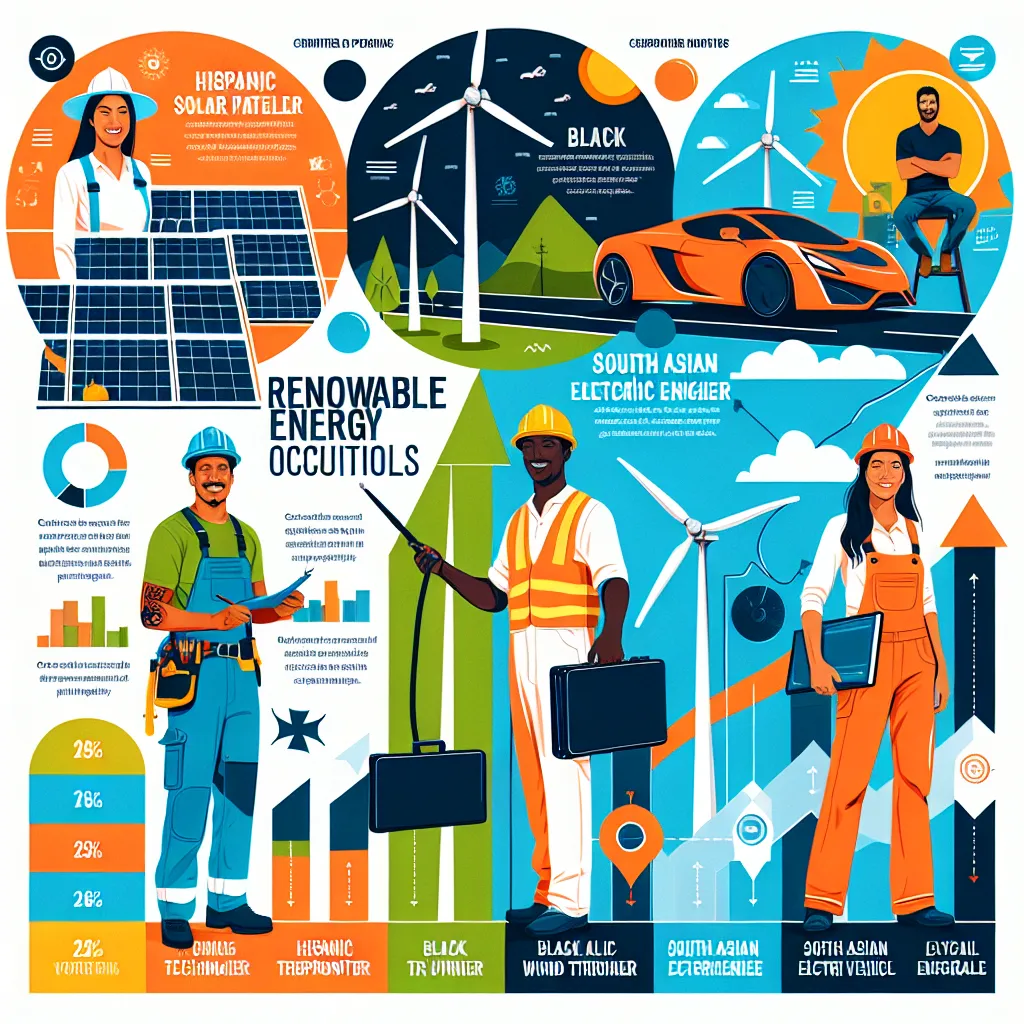The IELTS Reading section tests your ability to understand complex texts and answer various question types. Today, we’ll focus on a highly relevant topic: “Renewable energy’s impact on job markets.” This subject has been increasingly prevalent in recent IELTS exams, reflecting its growing importance in global discussions. Based on current trends and the frequency of appearance in past tests, it’s likely that you may encounter a similar theme in future IELTS Reading passages.
 Renewable Energy Jobs
Renewable Energy Jobs
Reading Passage
Renewable Energy: Reshaping the Global Job Market
The transition to renewable energy is not just an environmental imperative; it’s rapidly becoming a major driver of economic change, particularly in the job market. As countries worldwide pivot towards cleaner energy sources, the renewable sector is emerging as a significant employer, creating new opportunities while simultaneously challenging traditional industries.
In recent years, the renewable energy sector has experienced unprecedented growth. According to the International Renewable Energy Agency (IRENA), the industry employed 11.5 million people globally in 2019, a significant increase from 7.3 million in 2012. Solar photovoltaic (PV) technology leads the pack, accounting for 3.8 million jobs, followed by biofuels and hydropower.
This growth is reshaping job markets in several ways. Firstly, it’s creating entirely new job categories. Wind turbine technicians, solar panel installers, and biofuel processors are roles that barely existed a decade ago but are now among the fastest-growing occupations in many countries. These jobs often require specialized skills, driving demand for new training programs and educational courses.
Secondly, the renewable energy transition is transforming existing industries. The automotive sector, for instance, is undergoing a seismic shift as electric vehicles gain popularity. This change is not just affecting assembly line workers but also creating new roles in battery technology, charging infrastructure, and smart grid management.
However, the rise of renewables is not without challenges. As clean energy gains ground, traditional fossil fuel industries are facing pressure. Coal miners, oil rig workers, and others in carbon-intensive sectors are seeing job losses. This shift underscores the need for “just transition” policies to help workers in declining industries retrain and find new employment opportunities.
The impact of renewable energy on job markets varies significantly by region. Countries that have invested heavily in renewable technologies, like China and Germany, have seen substantial job creation in these sectors. In contrast, regions heavily dependent on fossil fuel extraction, such as parts of the United States and Australia, are grappling with the complexities of economic transition.
Looking ahead, the potential for job creation in renewables remains strong. IRENA projects that the number of jobs in the sector could reach 42 million globally by 2050 under an ambitious energy transition scenario. This growth is expected to more than offset the losses in fossil fuel industries.
The renewable energy transition is not just changing where we work, but also how we work. The decentralized nature of many renewable energy systems, particularly solar PV, is creating opportunities for small-scale entrepreneurship and community-owned energy projects. This shift could lead to more localized and resilient job markets.
In conclusion, the impact of renewable energy on job markets is multifaceted and far-reaching. While it presents challenges, particularly for workers in traditional energy sectors, the overall trend points towards significant net job creation. As the world continues its shift towards sustainability, the renewable energy sector is likely to play an increasingly crucial role in shaping the future of work.
Questions
True/False/Not Given
Determine if the following statements are True, False, or Not Given based on the information in the passage.
- The renewable energy sector employed more people in 2019 than in 2012.
- Wind energy creates more jobs than solar photovoltaic technology.
- The growth of renewable energy jobs is uniform across all countries.
- The automotive industry is experiencing significant changes due to the rise of electric vehicles.
- All workers from fossil fuel industries can easily transition to jobs in the renewable sector.
Multiple Choice
Choose the correct letter, A, B, C, or D.
-
According to the passage, which of the following is NOT mentioned as a new job category in the renewable energy sector?
A) Wind turbine technicians
B) Solar panel installers
C) Biofuel processors
D) Hydropower engineers -
The term “just transition” in the passage refers to:
A) The rapid shift from fossil fuels to renewable energy
B) Policies to help workers in declining industries find new jobs
C) The equal distribution of renewable energy jobs across regions
D) The transition of all energy production to renewable sources
Matching Headings
Match the following headings to the correct paragraphs in the passage. Write the correct number (i-vii) next to questions 8-12.
i. Regional variations in renewable energy job creation
ii. The decentralization of energy production and its impact on work
iii. The growth of the renewable energy job market
iv. Challenges faced by traditional energy sector workers
v. New job categories emerging in the renewable sector
vi. Future projections for renewable energy employment
vii. The transformation of existing industries
- Paragraph 3: _____
- Paragraph 4: _____
- Paragraph 5: _____
- Paragraph 6: _____
- Paragraph 8: _____
Short Answer Questions
Answer the following questions using NO MORE THAN THREE WORDS from the passage for each answer.
- Which renewable energy technology accounts for the most jobs globally?
- What type of policies are needed to help workers from declining industries?
- By which year does IRENA project renewable energy jobs could reach 42 million globally?
Answer Key and Explanations
-
True – The passage states that the industry employed 11.5 million people in 2019, up from 7.3 million in 2012.
-
False – The passage mentions that solar PV leads with 3.8 million jobs.
-
Not Given – The passage mentions regional variations but doesn’t state whether growth is uniform or not.
-
True – The passage mentions a “seismic shift” in the automotive sector due to electric vehicles.
-
Not Given – The passage mentions challenges but doesn’t state whether all workers can easily transition.
-
D – Hydropower engineers are not explicitly mentioned as a new job category.
-
B – The passage defines “just transition” as policies to help workers in declining industries retrain and find new employment.
-
v – This paragraph discusses new job categories like wind turbine technicians and solar panel installers.
-
vii – This paragraph talks about how existing industries, particularly automotive, are being transformed.
-
iv – This paragraph discusses the challenges faced by workers in traditional fossil fuel industries.
-
i – This paragraph explicitly discusses regional variations in renewable energy job creation.
-
ii – This paragraph discusses how renewable energy is changing how we work, mentioning decentralization and small-scale entrepreneurship.
-
Solar photovoltaic
-
Just transition
-
2050
Common Mistakes and How to Avoid Them
-
Misinterpreting “Not Given” statements: Remember, “Not Given” means the information is neither confirmed nor contradicted in the passage. Don’t make assumptions based on general knowledge.
-
Overlooking specific details: In questions like number 6, it’s crucial to carefully check all options against the information in the text.
-
Failing to understand context: For questions like number 7, understanding the context in which a term is used is essential for selecting the correct answer.
-
Matching headings incorrectly: When matching headings, focus on the main idea of each paragraph, not just keywords.
-
Exceeding word limits in short answer questions: Always adhere to the word limit specified in the instructions.
Vocabulary
- Imperative (noun): An essential or urgent thing
- Pivot (verb): To turn or rotate
- Unprecedented (adjective): Never done or known before
- Seismic (adjective): Having enormous consequences
- Grappling (verb): Struggling to deal with or overcome something
- Multifaceted (adjective): Having many different aspects or features
Grammar Focus
Pay attention to the use of present perfect tense in sentences like “The renewable energy sector has experienced unprecedented growth.” This tense is used to describe actions that started in the past and continue to have relevance in the present.
Tips for Success in IELTS Reading
- Practice time management: Allocate your time wisely across all sections of the reading test.
- Improve your skimming and scanning skills: These are crucial for quickly locating specific information in the text.
- Read the questions carefully: Understand exactly what each question is asking before searching for the answer.
- Don’t rely on prior knowledge: Base your answers solely on the information provided in the passage.
- Expand your vocabulary: Regularly learn new words, especially those related to common IELTS topics like environment, technology, and social issues.
Remember, success in IELTS Reading comes with consistent practice and familiarity with various question types. Keep practicing with diverse texts and question formats to improve your skills and confidence.
For more insights on related topics, check out our articles on renewable energy’s impact on global markets and renewable energy’s influence on fossil fuel industries.


